The Invertase Market is estimated to be valued at USD 65.2 million in 2025 and is projected to reach USD 97.5 million by 2035, registering a compound annual growth rate (CAGR) of 4.1% over the forecast period.
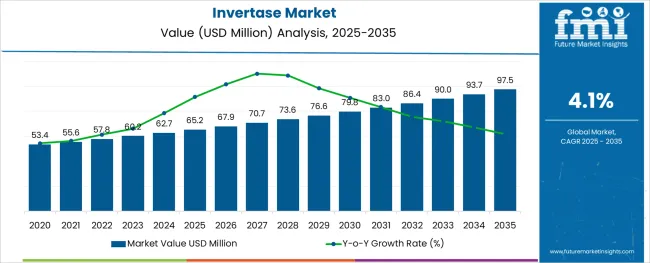
The invertase market is undergoing consistent growth as industries increasingly prioritize natural enzymes to enhance product quality and meet clean-label expectations. Rising awareness of enzymatic processing benefits, such as improved sweetness profiles, extended shelf life, and enhanced texture in food products, is reshaping demand across various sectors.
Stringent regulations against synthetic additives and the growing emphasis on sustainable production methods have further bolstered the market. Ongoing innovation in fermentation and purification techniques is improving yield and cost-efficiency, creating favorable conditions for adoption.
Looking ahead, expanding applications beyond traditional food and beverages into pharmaceuticals, cosmetics, and biotechnology are expected to unlock additional growth opportunities. Collaborative initiatives between enzyme manufacturers and end-users to develop customized solutions and optimize formulations are paving the way for long-term market expansion and competitive differentiation.
The market is segmented by Source, End-User, Region, and Distribution Channel and region. By Source, the market is divided into Microorganisms-based Invertase and Industries Plant-based Invertase. In terms of End-User, the market is classified into Food & Beverages, Pharmaceuticals, Personal Care, and Other.
Based on Region, the market is segmented into Asia Pacific, North America, Latin America, Europe, Oceania, and Middle East and Africa (MEA). By Distribution Channel, the market is divided into Online, Convenience Store, Hypermarket/Supermarket, and Direct Selling. Regionally, the market is classified into North America, Latin America, Western Europe, Eastern Europe, Balkan & Baltic Countries, Russia & Belarus, Central Asia, East Asia, South Asia & Pacific, and the Middle East & Africa.
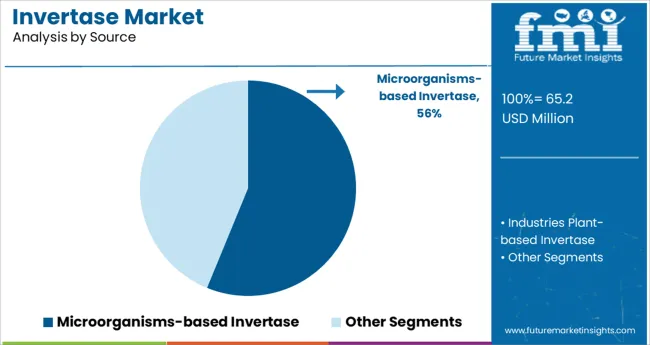
When segmented by source, microorganisms based invertase is anticipated to hold 56.2% of the total market revenue in 2025, making it the leading source segment. This leadership is attributed to its scalability, consistent quality, and cost efficiency compared to plant or animal derived alternatives.
Production of invertase through microbial fermentation enables controlled conditions, higher enzyme yields, and easier downstream processing, which has driven widespread industrial adoption. The ability to meet stringent purity standards while minimizing environmental impact has reinforced its preference among manufacturers.
Additionally, technological advances in microbial strain engineering and fermentation optimization have significantly enhanced productivity, reducing unit costs and ensuring a reliable supply. These advantages have strengthened the position of microorganisms based invertase as the preferred choice for large scale commercial applications where uniformity and sustainability are critical.
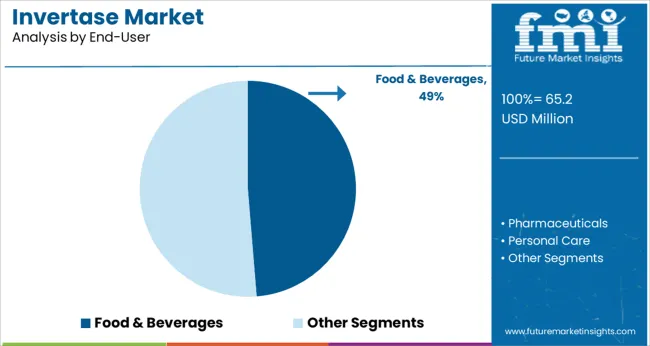
Segmented by end user, food and beverages is expected to account for 48.7% of the invertase market revenue in 2025, maintaining its position as the dominant segment. This prominence has been driven by the essential role of invertase in confectionery, bakery, and beverage formulations, where it imparts desirable sweetness, moisture retention, and shelf stability.
Manufacturers have increasingly incorporated invertase into recipes to replace artificial sweeteners and enhance sensory attributes in alignment with clean label trends. The capacity of invertase to prevent crystallization in syrups and improve texture in soft-centered candies has further strengthened its relevance.
Evolving consumer preferences for natural ingredients and the expansion of premium and artisanal food products have also accelerated demand. The segment’s dominance has been reinforced by its established infrastructure, high-volume requirements, and continuous innovation in product development by leading food brands.
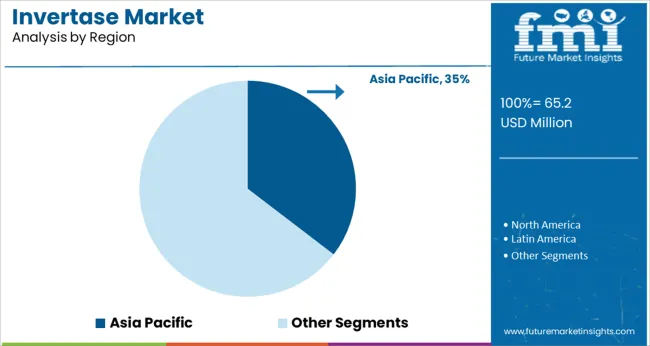
When segmented by region, Asia Pacific is projected to capture 35.4% of the market revenue in 2025, securing its position as the leading regional market. This leadership has been supported by rapid industrialization, growing population, and rising disposable incomes that are fueling demand for processed food, beverages, and personal care products.
Local production capacities have expanded in response to both domestic consumption and export opportunities, strengthening regional competitiveness. Governments and industries in the region have increasingly promoted biotechnological advancements and investments in enzyme production facilities, creating a favorable ecosystem for growth.
The availability of cost-effective raw materials, skilled workforce, and robust distribution networks has further enhanced the attractiveness of the Asia Pacific market. Cultural preferences for sweetened products and the emergence of health-conscious consumer segments have combined to sustain strong regional demand for invertase-based applications.
Complex molecules called enzymes to act as bio-catalysts in living tissue to improve metabolic processes. A carbohydrate enzyme that helps with digestion is invertase. Additionally known as beta-fructo-furanosidase. The Saccharomyces cerevisiae strain also referred to as baker's yeast is the source of invertase. Fructose and glucose are produced when sucrose is broken down into two parts with the help of invertase.
Once purified, it can be used alone or in conjunction with other enzymes. When combined, it facilitates the breakdown of starch, sugar, and other carbohydrate types. It is widely accessible from both plants and microorganisms. There are many uses for invertase.
It helps control osmosis and plant immune defenses in addition to helping humans have a better immune system and acting as an antioxidant. Additionally, because it is obtained naturally, using organic ingredients in meal preparation is a preferred option among meat producers.
A new report published by Future market insights, titled, Invertase Market -Global Opportunity Analysis and Industry Forecast, 2025 to 2035, projects the global Invertase market to reach USD 97.5.0 million by 2035 and is expected to grow at a CAGR of 5.30% from 2025 to 2035.
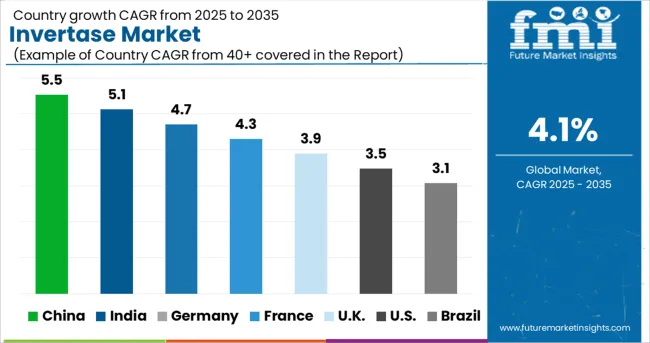
The Asia Pacific region offers a promising market for invertase since it provides an advantageous platform for studies and development. During the forecast timeframe, the Asia-Pacific bakery products market is expected to expand at a 6.6% CAGR. A burgeoning number of Western restaurants offering baked goods in metropolitan areas is also rapidly emerging, increasing demand for bakery products. This factor is expected to accelerate the expansion of the invertase market in this region.
Another significant driver of the market is a broader portfolio with several value-added products such as reduced sugar, enhanced nutrition, plant-based products, multiple distribution channels, and consumers' proclivity to buy off-the-shelf, particularly in this region's emerging markets.
Consumers prefer products that are naturally sourced, and since invertase is widely available in nature, industries in North America are using it to develop new food processing techniques.
Due to developments in food ingredients and technology, as well as rising regional consumption, the United States is anticipated to overwhelm the market in North America. The market is dominated by the United States, which is also driving the market's expansion in North America. With favorable annual growth during the forecast period, Canada is dominant due to the region's booming emerging economies and people's lifestyles. A market share of 38.0% of the worldwide invertase market is held by North America.
The European invertase business has a well-developed supply chain, a wide range of products, effective distribution methods, and consumer preferences. Cakes, baked goods, and cookies are among the categories of decadence that have seen an increase in new innovation and product development.
The growth of the invertase industry in Europe, which would be cruising the expansion of the industry under consideration, is accelerated by rising consumer consciousness of health-conscious products and broadening demand for processed foods. Sales have increased as a result of several health claims related to bakery products, including organic, no flavorings, and low/no/reduced allergen. On the global invertase market, Europe has a 24.5% market share.
Significant progress has been made in improving how different enzymes and their properties are operationally evaluated. The market for invertase is growing as a result. Invertase is widely utilized as a food ingredient and is frequently utilized as an invert sugar in the production of candy bars and commercial cooking due to its ability to retain humidity for extended periods of time.
It can be used to make a highly crystalline syrup, also known as inverted syrup because it is hygroscopic. Invertase also facilitates the acquisition of alcohols, glycerin, and lactic acid during the sucrose fermentation process. The business for invertase enzymes has seemed to be experiencing opportunistic growth as a result of rising customer demands novel solutions, particularly in the industries of food and beverages.
Additionally, invertase is used to improve digestion, boost the immune system, support antioxidants, and fight cancer. Invertase can also function in a variety of pH conditions. Its relevance to the pharmaceutical sector thus expands. As a result, numerous uses contribute to the invertase market's fast expansion.
The invertase enzyme, on the other hand, can cause vomiting, diarrhea, and fatigue. Additionally, it may lead to diabetes, so invertase-containing products are not advised for diabetic patients.
As a result, in areas where the prevalence of diabetes is high, the growth of invertase sales may be constrained. Enzyme coupling is also fairly expensive. As a result, its applicability to various industries may decline, which would restrain the market's growth for invertase.
It can be discovered in many personal care items, such as hair products, shampoos, hair dyes, as well as styling products. Additionally, invertase is found in beauty products to help break down dry skin and hasten cell turnover. Cosmetics contain invertase as a food preservation and fragrance component. The products for the personal care market are anticipated to experience significant demand as a result of the expansion in the invertase sector.
Plant invertase is a renowned class of enzymes that catalyzes the conversion of sucrose into glucose and fructose. They have been found in numerous plant tissues and are important for the growth and metabolism of plants. In the upcoming years, it is anticipated that the plant invertase market will grow.
The Invertase in the market is expected to grow at a CAGR of 5.30% during the forecast period of 2025 to 2035. The growth of Invertase in the market is being propelled by supermarket and industrial distributors.
It is a natural enzyme that is used as a food ingredient to sweeten food items, as well as for other applications such as brewing beer. Invertase has seen an increase in demand due to its wide range of uses and its ability to be tailored to suit various needs. Supermarkets and industrial distributors are helping this growth by making it more accessible across the world.
Supermarket and industrial distributors have been introducing Invertase into their product portfolios, allowing customers greater access than ever before. Furthermore, these distributors are offering Invertase at competitive prices so that companies can purchase it with ease. This has resulted in increased availability of the enzyme for both commercial use and home cooking alike.
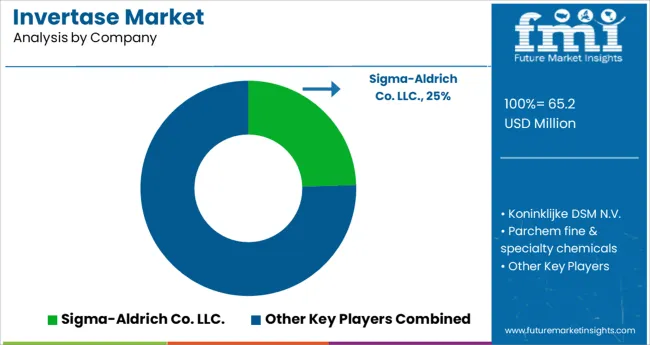
To boost their sales and acquire a competitive advantage in the global invertase market, these major invertase providers are implementing a variety of strategies, including new product developments and approvals, partnerships, cooperation, acquisitions, mergers, etc.
For example, the EZ-Yeast TM Transformation Kit from MP Biomedical, which was introduced in June 2024, is designed for high-throughput transformation and can produce up to 103 transformants per g of plasmid DNA.
In order to satisfy any taste preferences, Koninklijke DSM launched the N.V.Maxarome line of specialized fermentation extracts in February 2025. These extracts feature taste-building elements that enhance the overall flavor and aroma and intensify salty, thick, and umami tastes.
| Attribute | Details |
|---|---|
| Forecast Period | 2025 to 2035 |
| Historical Data Available for | 2020 to 2025 |
| Market Analysis | USD million for Value and Units for Volume |
| Key Regions Covered | North America; Latin America; Europe; Asia Pacific; Oceania; Middle East and Africa (MEA) |
| Key Countries Covered | The USA, Canada, Mexico, Germany, The United Kingdom, France, Italy, Spain, China, Japan, India, South Korea, Australia, Brazil, Argentina, South Africa, UAE |
| Key Segments Covered | By Type, By Source, By End-user, By Region, By Distribution Channel |
| Key Companies Profiled | Sigma-Aldrich Co. LLC.; Koninklijke DSM N.V.; Parchem Fine & Specialty Chemicals,; SternEnzym GmbH & Co. KG; Kerry Inc., Meteoric Exim Private Limited; MP Biomedicals LLC; BIO-CAT; Megazyme Inc.; Fidopharma |
| Report Coverage | Market Forecast, Company Share Analysis, Competitive Landscape, DROT Analysis, Market Dynamics and Challenges, and Strategic Growth Initiatives |
| Customization & Pricing | Available upon Request |
The global invertase market is estimated to be valued at USD 65.2 million in 2025.
It is projected to reach USD 97.5 million by 2035.
The market is expected to grow at a 4.1% CAGR between 2025 and 2035.
The key product types are microorganisms-based invertase and industries plant-based invertase.
food & beverages segment is expected to dominate with a 48.7% industry share in 2025.






Full Research Suite comprises of:
Market outlook & trends analysis
Interviews & case studies
Strategic recommendations
Vendor profiles & capabilities analysis
5-year forecasts
8 regions and 60+ country-level data splits
Market segment data splits
12 months of continuous data updates
DELIVERED AS:
PDF EXCEL ONLINE

Thank you!
You will receive an email from our Business Development Manager. Please be sure to check your SPAM/JUNK folder too.
Chat With
MaRIA